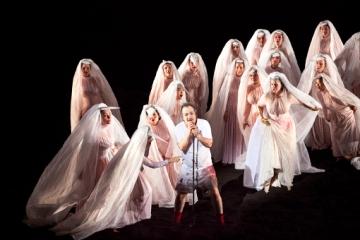Nikolai Rimski-Korsakov - Sadko (2017)
Nikolai Rimski-Korsakov - Sadko (2017)

Zurab Zurabishvili - Sadko Betsy Horne - Sea Princess Volkhova Anatoli Kotscherga - Sea King Victoria Yarovaya - Lubava Bustayevna Raehann Bryce-Davis - Nezhata Michael J. Scott - Sopel Tijl Faveyts - Varyazhskyi merchant Adam Smith - Hindu merchant Pavel Yankovski - Venetian merchant Evgeni SolodovnikovЕвгений - Duda Choir - Chorus of Opera Vlaanderen Orchestra - Orchestra of Opera Vlaanderen Music director - Dmitri Jurowski Director - Daniel Kramer 2 July 2017, Opera Gent
Opera is capable of great ironic timing. On Monday, the hapless David Davis trooped into Brussels to begin Brexit negotiations with the European Union. The next day, half an hour northwest in Ghent, the enterprising Opera Vlaanderen unveiled its new production of Sadko, whose hero yearns to widen the narrow minds of the citizens of Novgorod and open up trade with their neighbours. Rimsky-Korsakov’s opera has some toothsome musical moments within its seven tableaux, but is rarely performed outside Russia. Sadly, I doubt that Daniel Kramer’s dismal staging will win it many new friends.
The plot is rooted in 12th-century folklore. Sadko is a minstrel, a dreamer who suggests Novgorod would be more prosperous if a river joined Lake Ilmen to the ocean, thus opening up new trade routes. The townspeople deride him, so Sadko consoles himself by singing beside the lake, attracting a flock of swans – daughters of the Sea King – who transform into beautiful maidens. They are led by Princess Volkhova, who wishes to marry a mortal. She and Sadko fall in love and she fixes it for him to catch three golden fish, thus winning a huge wager that enables him to buy merchandise and ships. Sadko’s ship, however, is becalmed on its return voyage and, to placate the grumpy Sea King, Sadko sacrifices himself, plunging to the ocean bed. There he plays the gusli for his wedding celebrations, causing a huge storm from which he and Volkhova escape. Volkhova sings Sadko a lullaby before being transformed into the River Volkhova, enabling Sadko’s ships to sail into Lake Ilmen amidst general rejoicing.
Kramer enthuses about dusting off the score of this “ancient dead ancestor” but decides that he doesn’t always like what he sees and imposes his own version of events. There is voluble programme note guff about protectionism and cosmopolitanism and Sadko keeping his masculine and feminine sides in balance. Kramer updates the action, the minstrel Sadko becoming a failed nightclub singer, earning the derision and ritual humiliation of the Novgorod townspeople – couch potatoes obsessed with the shopping channel. A giant video screen is angled over the set, hyperactively spewing images of consumerism – Scrooge McDuck and Chelsea footballers – amidst glitterballs and lunar landscapes. The Varangian, Indian and Venetian guests (for whom Rimsky provides some of the opera’s best music) are travel agents, touting the merits of their land which quickly dissolve into images of hijacking and slums.
Rimsky-Korsakov’s score has its longueurs but includes magical moments. Early in his compositional career – which coincided with his time in the Russian Navy – he wrote his tone poem Sadko (which I heard the Moscow Philharmonic play just last month). Thirty years later, he took its themes as motifs for his opera. Rimsky’s orchestral writing is opulent, almost Wagnerian – there are even hints of the Rhine’s swirling waters at one point. Dmitri Jurowski drew plenty of dramatic colour from Opera Vlaanderen’s excellent orchestra, while the Chorus sang lustily in the many crowd scenes.---Annemie Augustijns, bachtrack.com
This magical opera by Rimsky-Korsakov tells the story of the artist Sadko who, through his art, wishes to convince others to escape their isolation and discover new worlds. However, his dream is met with hostility. Only Volkhova, the daughter of the Sea King, enraptured by Sadko’s music, helps him to realise his visionary ideas. Rimsky-Korsakov based his story for Sadko on a mediaeval ‘bylina’ or epic about the eponymous adventurer, merchant and minstrel, blending it with various legends of the sea. Balancing between the worlds of humans and the sea and between myth and reality, Sadko emerges as a Slavic variant of both Orpheus and Odysseus. He embodies the creative force of fantasy that wages war with reality.
While director Daniel Kramer reads Sadko as an inner journey between a masculine, explorative and a feminine, spiritual view of the world, in his thoroughly lyrical score, Rimsky-Korsakov brings together Russian folk music and lively ballads with a dynamic orchestration. After a Tchaikovsky triptych, Lady Macbeth of Mtsensk (Shostakovich) and Khovanshchina (Mussorgsky) Opera Vlaanderen will continue its fascinating exploration of Russian opera under the energetic musical direction of Dmitri Jurowski. ---operaballet.be
download (mp4 @2991 MB):
Last Updated (Saturday, 01 May 2021 18:47)








